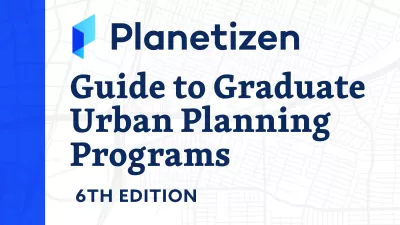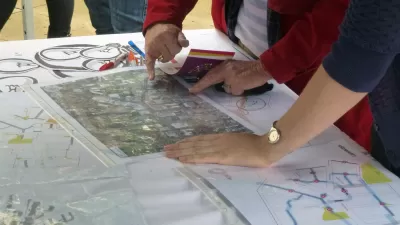The 7th Edition of the Planetizen Guide to Graduate Urban Planning Programs, now available, includes an updated ranking of the Top 25 master’s programs in urban planning, city planning, regional planning, and community planning.

Planetizen publishes the top 25 master’s programs in planning in the Guide to Graduate Urban Planning Programs (Guide), currently in its 7th Edition.
Topping the Top 25 for the first time is the Master of Urban and Regional Planning program at the University of California, Los Angeles, followed by the Massachusetts Institute of Technology; Rutgers, the State University of New Jersey; the University of California, Berkeley; and the University of North Carolina at Chapel Hill.
The 7th Edition of the Guide required a large-scale data collection effort, collecting information from 69 participating programs and hundreds of educators. For the first time ever for the 7th Edition, Planetizen also surveyed past buyers of the Guide for insight into the most important considerations when choosing a graduate program. That feedback, collected from more than two hundred respondents, helped inform some adjustments to the methodology of the 7th Edition compared to previous editions. The Guide’s rankings methodology evaluates data using a quartile system, with 29 metrics organized into four criteria: 1) Program Characteristics, 2) Faculty Characteristics, 3) Student Characteristics, and 4) Opinion of Planning Educators.
Planetizen publishes the following list of the top ten graduate planning programs online to promote awareness about the comprehensive package of information found in the Guide. Planetizen's intentions for publishing the Guide, including the following list, is to grow the field of planning by helping the right students find the right graduate programs—please read below the rankings to learn more about how to use these rankings as one component of an informed decision about graduate school.
| Top 10 Graduate Urban Planning Programs | 2023 RANK |
| University of California, Los Angeles | 1 |
| Massachusetts Institute of Technology | 2 |
| Rutgers, The State University of New Jersey | 3 |
| University of California, Berkeley | 4 |
| University of North Carolina, Chapel Hill | 5 |
| Georgia Institute of Technology | 6 |
| Harvard University | 7 |
| University of Southern California | 8 |
| University of Texas at Austin | 9 |
| Tufts University | 10 |
| Source: Planetizen Guide to Graduate Urban Planning Programs, 7th Edition | |
| www.planetizen.com/topschools Copyright 2023 Planetizen |
Navigating Graduate School and a Planning Career
To provide guidance on the process of applying for graduate school and planning a career, and to ensure that the rankings are not the sole factor in influencing the choices of student planners about where to pursue a graduate education, the Guide includes interviews with current graduate students and professional planners as well as essays from Planetizen staff and Ann Forsyth, planning professor at Harvard University. The 7th Edition also includes 95 profiles of U.S. master’s programs, and, for the first time, new research about the planning job market by Henry Renski and Camille Barchers, from the University of Massachusetts Amherst, and Jamaal William Green, from the University of Pennsylvania.
The information collected in the Guide reveals a dynamic field, with almost infinite potential for creating a unique career path that corresponds to individual passions and interests. Planning graduate students are allowed a great deal of freedom to experiment and innovate while pursuing a master’s degree, thanks to the large number of intersecting fields that offer planners opportunities for employment, such as urban design, zoning administration, transportation planning, rural development, grant writing, and community advocacy and organizing, just to name a few.
While the rankings are important to many potential students, previous buyers of the Guide report that rankings were less informative than program details in the level of importance for determining a choice in school. So, more important questions than how high a program ranks are questions such as: Is this program located in the type of urban environment I'd like to explore and potentially make a life? Do the professors' interests match my own? Are there opportunities for internships in the area around this program that can set me up for a well paying job after graduation?
The Evolution of Planning
The 7th Edition of the Planetizen Guide to Graduate Urban Planning Programs captured, as much as possible, the realities of graduate-level education in planning after the Covid-19 pandemic, but students should be prepared to evaluate whether individual programs are doing enough to accommodate public health concerns while maintaining high standards of personalized, effective education. The Guide includes references to whether programs allow online study, part-time study, or hybrid workloads, for example. Some of the professional and student interviews also directly address how planning education has changed since the pandemic.
On the profile pages, each program is offered a chance to express how they are responding to the other great risks of the century—such as racial justice and equity, the environmental risks of climate change, and growing class inequality. The planners of the past are responsible, to varying degrees, for the risks of the current world. It's on the planning programs of the present day to make sure the planners of the future are equipped to undo that damage. Each program acknowledges that responsibility to varying degrees. Selecting a graduate program will be the first choice of many in a planning career that plays a role in these evolving dynamics in the world. While accounting for factors like student demographics and faculty demographics, the rankings can't possibly capture the full context of the consequences of these decisions for each individual student.
Let these rankings be a starting point, but not an ending point, for choosing the best fit for you. The right students can find the right programs, and vice versa, with the help of this Guide—but nothing in this Guide should make that choice for you. More advice about how to make a decision about where to study is included in the book—what questions to ask, what to look for, and who to talk to—but ultimately, the decision is up to each individual student.
Learn more about the 7th Edition of the Planetizen Guide to Graduate Urban Planning Programs.
Search for graduate, undergraduate, and certificate programs in urban planning and related fields from around the world in Planetizen's Online Directory of Urban Planning Programs.

Study: Maui’s Plan to Convert Vacation Rentals to Long-Term Housing Could Cause Nearly $1 Billion Economic Loss
The plan would reduce visitor accommodation by 25,% resulting in 1,900 jobs lost.

Placekeeping: Setting a New Precedent for City Planners
How a preservation-based approach to redevelopment and urban design can prevent displacement and honor legacy communities.

Using Old Oil and Gas Wells for Green Energy Storage
Penn State researchers have found that repurposing abandoned oil and gas wells for geothermal-assisted compressed-air energy storage can boost efficiency, reduce environmental risks, and support clean energy and job transitions.

Washington State Plans Ambitious ‘Cycle Highway’ Network
The state is directing funding to close gaps in its existing bike network and make long-distance trips more accessible.

Homeowners Blame PG&E for Delays in ADU Permits
The utility says it has dramatically reduced its backlog, but applicants say they still face months-long delays for approvals for new electrical work.

Rethinking Wildfire Defense: How a Landscape Approach Can Protect Neighborhoods
Post-fire analysis of the Eaton Fire reveals that a landscape approach — including fire-resistant vegetation, home hardening, and strategic planning — can help reduce wildfire risk, challenging assumptions that trees and plants are primary fire hazards.
Urban Design for Planners 1: Software Tools
This six-course series explores essential urban design concepts using open source software and equips planners with the tools they need to participate fully in the urban design process.
Planning for Universal Design
Learn the tools for implementing Universal Design in planning regulations.
Borough of Carlisle
Caltrans
Heyer Gruel & Associates PA
Institute for Housing and Urban Development Studies (IHS)
City of Grandview
Harvard GSD Executive Education
Salt Lake City
NYU Wagner Graduate School of Public Service
City of Cambridge, Maryland





























